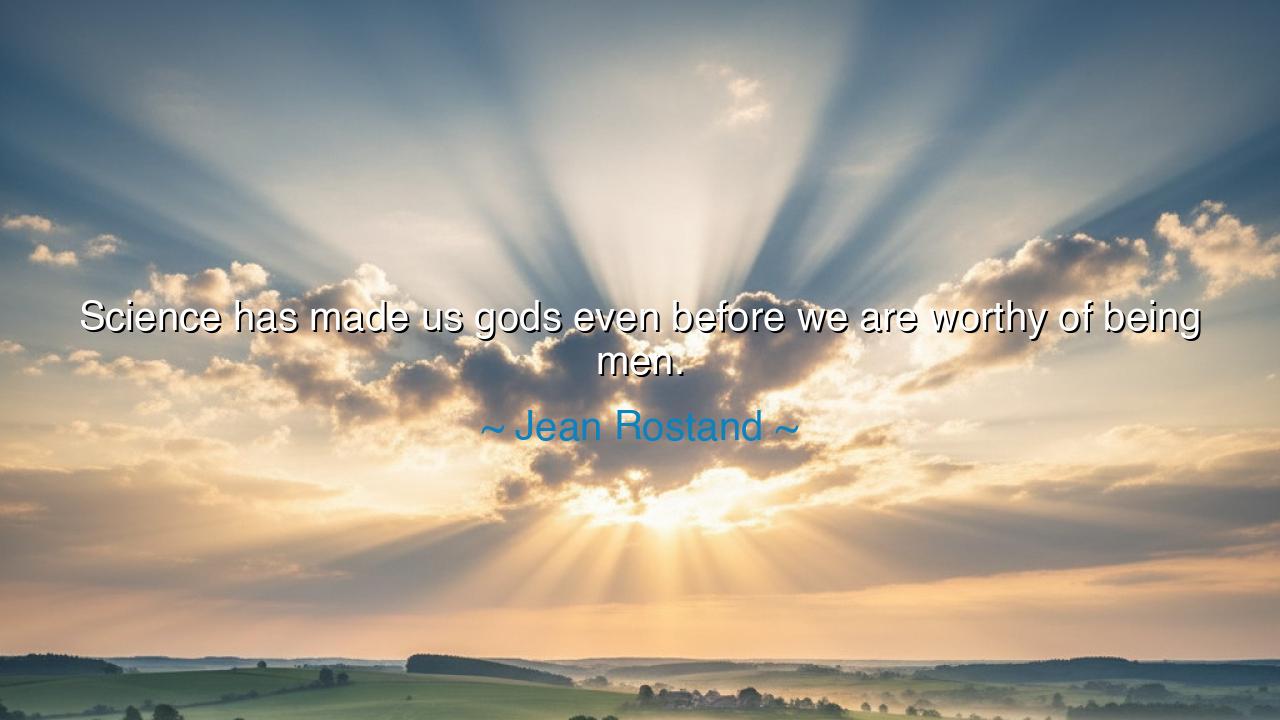
Science has made us gods even before we are worthy of being men.






"Science has made us gods even before we are worthy of being men." These powerful words spoken by Jean Rostand carry a profound reflection on the nature of human progress and the responsibility that comes with it. Rostand warns us of the paradox that humanity faces in the modern age: we have gained the ability to wield powers once thought to belong only to the gods, yet we still struggle with the fundamental qualities that make us truly human. In the pursuit of knowledge, we have acquired the ability to manipulate the very fabric of nature, from the tiniest elements of life to the vast reaches of space. And yet, despite this god-like power, we are often found lacking in the wisdom and moral strength necessary to wield it responsibly. In our quest for mastery over the world, we have not always gained the wisdom to govern ourselves.
In the ancient world, the gods were often seen as the arbiters of the universe’s greatest forces, shaping the lives of mortals with their immense power. Yet, the gods themselves were rarely portrayed as perfect beings. They were often capricious, even flawed—their immense power was tempered by their humanity, their jealousy, and their pride. Prometheus, the titan who defied the gods to bring fire to humankind, embodies this tension. He gifted fire, a divine power, to humans, enabling them to rise above their primal state and create civilization. However, his gift also came with consequences, as it led to both enlightenment and suffering. Just as Prometheus brought light to mankind, so too does modern science offer us incredible powers—the ability to manipulate genes, to travel through space, to harness the very forces of life. But just as Prometheus suffered for his actions, we too face the consequences of a knowledge that we may not yet fully understand how to control.
Consider the story of Frankenstein, the modern myth born from Mary Shelley’s imagination. Dr. Frankenstein, much like modern scientists, created life from inanimate matter, effectively becoming a god in his laboratory. Yet, his inability to foresee the moral implications of his creation led to tragedy, as his monster turned against him and those he loved. Shelley’s tale is a reflection of Rostand’s warning: we have the power to create, but without the wisdom to understand the consequences, we may unleash forces beyond our control. Just as Dr. Frankenstein played god and found himself unworthy of his creation, so too must we recognize that science, when unchecked by moral clarity, can lead us to paths we are not yet prepared to tread.
Rostand’s words also echo the scientific revolutions that have occurred over the centuries, particularly in the fields of genetics, cloning, and artificial intelligence. DNA sequencing, once the realm of science fiction, is now a reality. We can now map the genetic codes that make us who we are, and even edit those codes, altering the very blueprint of life. This power is god-like, enabling us to cure diseases, enhance human abilities, and potentially extend our lives. Yet, with these breakthroughs, we also face the reality of being unprepared for their ethical implications. Just as ancient civilizations feared the wrath of gods who held power beyond their understanding, so too do we now stand before a power whose consequences we may not fully understand. The challenge we face is whether we, as humans, are worthy of the power we’ve gained. Have we, like the gods of old, gained tremendous power without the wisdom to handle it?
The lesson of Rostand’s quote is one of humility and responsibility. The gift of knowledge is not an unqualified blessing. The ancient philosophers understood that wisdom—the ability to apply knowledge for the greater good—was the highest virtue. Socrates believed that knowledge should lead to a deeper understanding of our place in the world and guide our actions in a moral direction. Today, in our age of scientific discovery, we must ask ourselves: Have we gained knowledge without also gaining the wisdom to use it wisely? Science has given us the tools to be like gods, but it is morality, ethics, and wisdom that will determine whether we use these tools for the benefit of all or for our own destruction.
In your own life, reflect on how you use the knowledge at your disposal. Do you apply it with humility and a sense of responsibility, or do you, like Icarus, fly too close to the sun, blinded by the power that comes with understanding? The age of science has provided humanity with god-like power, but as Rostand suggests, we must always remember that power without wisdom can lead to ruin. Strive to be like the ancients, who saw knowledge as both a gift and a burden, a path that requires constant reflection and moral responsibility. In every action, in every discovery, consider not only what you can do, but what you should do. Approach the gifts of science not as a right, but as a sacred duty—a duty to use the power you wield for the good of all.
Thus, let Rostand’s warning guide you on your own journey through life. Science, with its tremendous capabilities, is a double-edged sword. It is a gift that can elevate us to god-like heights, but it is also a force that, if misused, can bring about great destruction. Strive for the wisdom that comes with knowledge, and let that wisdom guide you in the way you use the gifts of science in your own life. Do not fall into the trap of believing that power alone makes you great; remember, true greatness lies in the responsibility that comes with it.






AAdministratorAdministrator
Welcome, honored guests. Please leave a comment, we will respond soon